Documents related to southwest of Viet Nam at the social sciences library and their values for studying the region history today
The paper introduces a document collection on the Southwest region of Vietnam
which is currently being stored at the Social Sciences Library of the Vietnam Academy of Social
Sciences and managed by the Institute of Social Sciences Information. Out of tens of thousands
of documents at the École Française d’Extrême-Orient (EFEO, French School of Asian
Studies) which were handed over to Vietnam in 1957, several hundreds of documents covering
various fields such as history, archaeology, culture, anthropology, religion and geography.
related to the Southwest region have been surveyed, selected and classified. This is the most
original, plentiful, reliable and invaluable source of documents for in-depth examination and
research on the historical issues of this region. It also has a great significance contributing
to set up a scientific basis for the development strategy of the Southwest in regard to the
economic, cultural and social issues and the protection of national security and sovereignty.
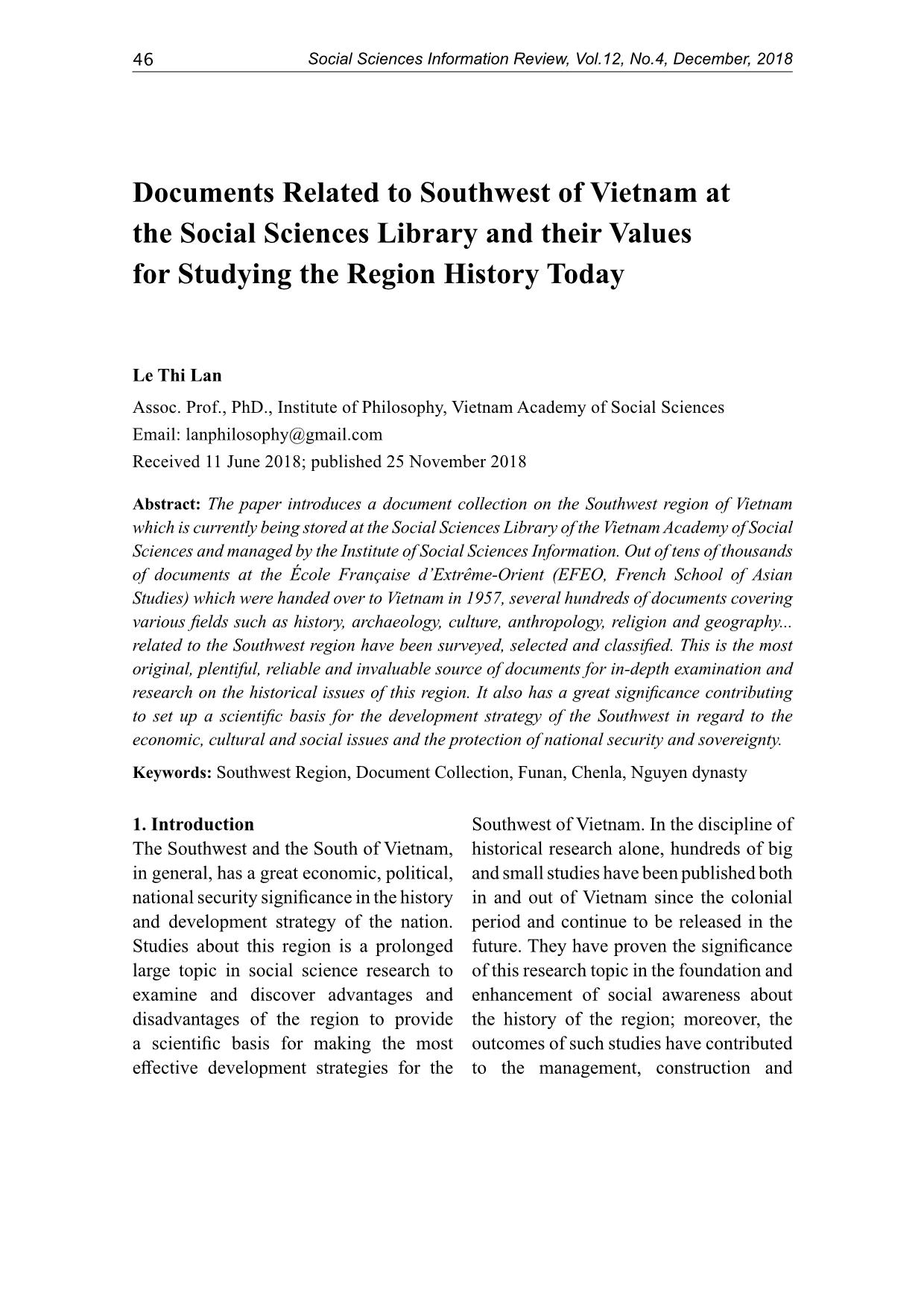
Trang 1
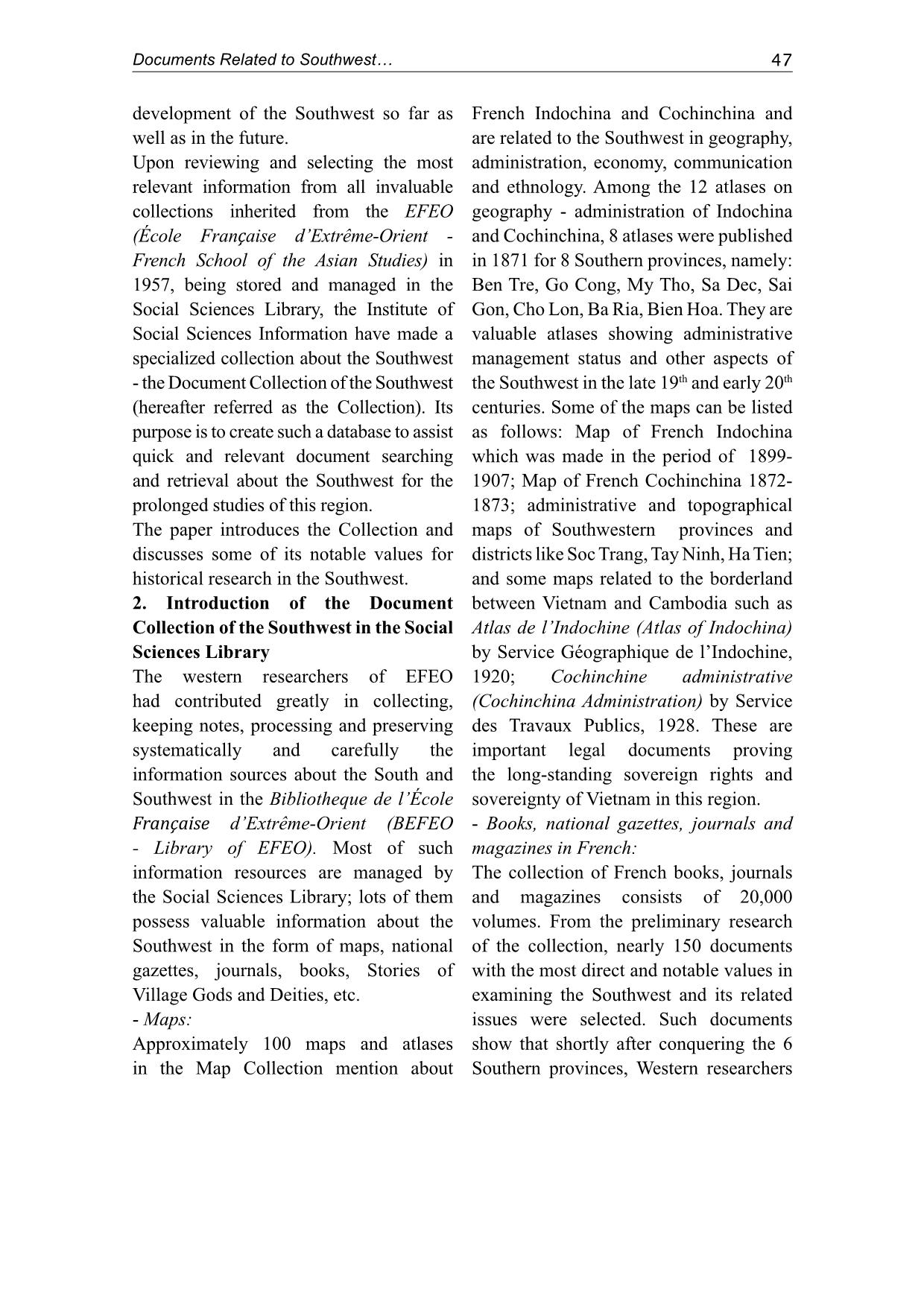
Trang 2
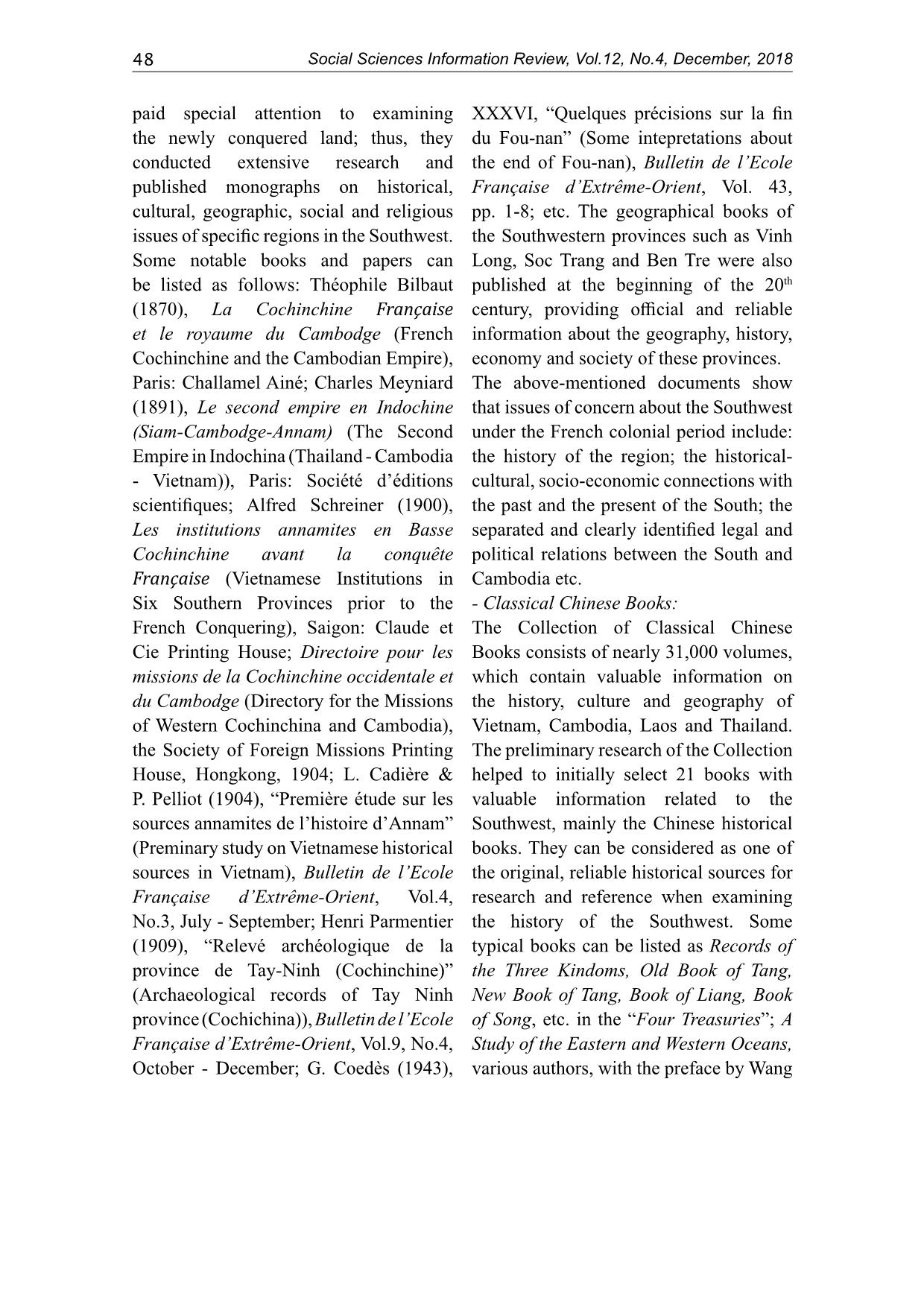
Trang 3
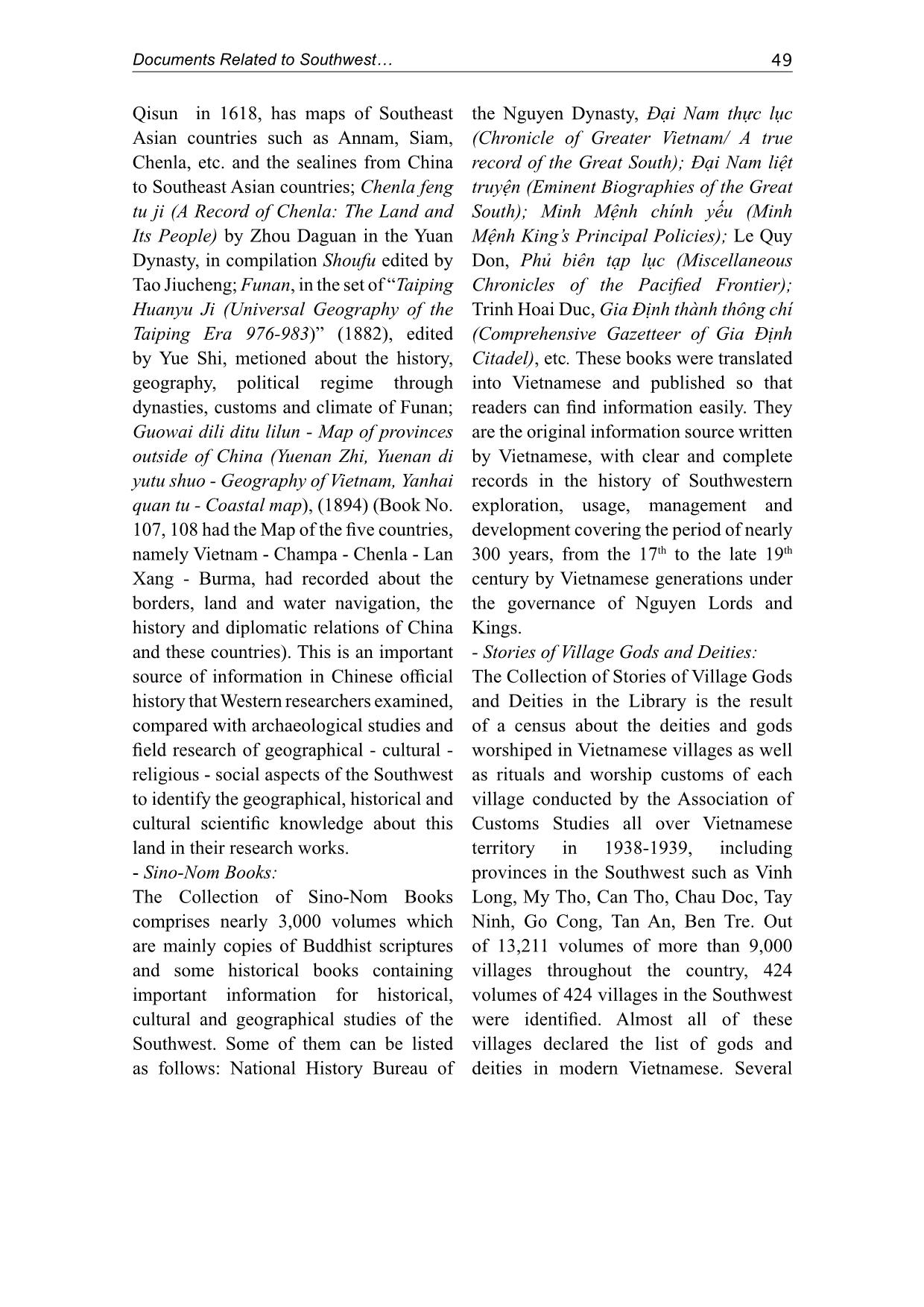
Trang 4
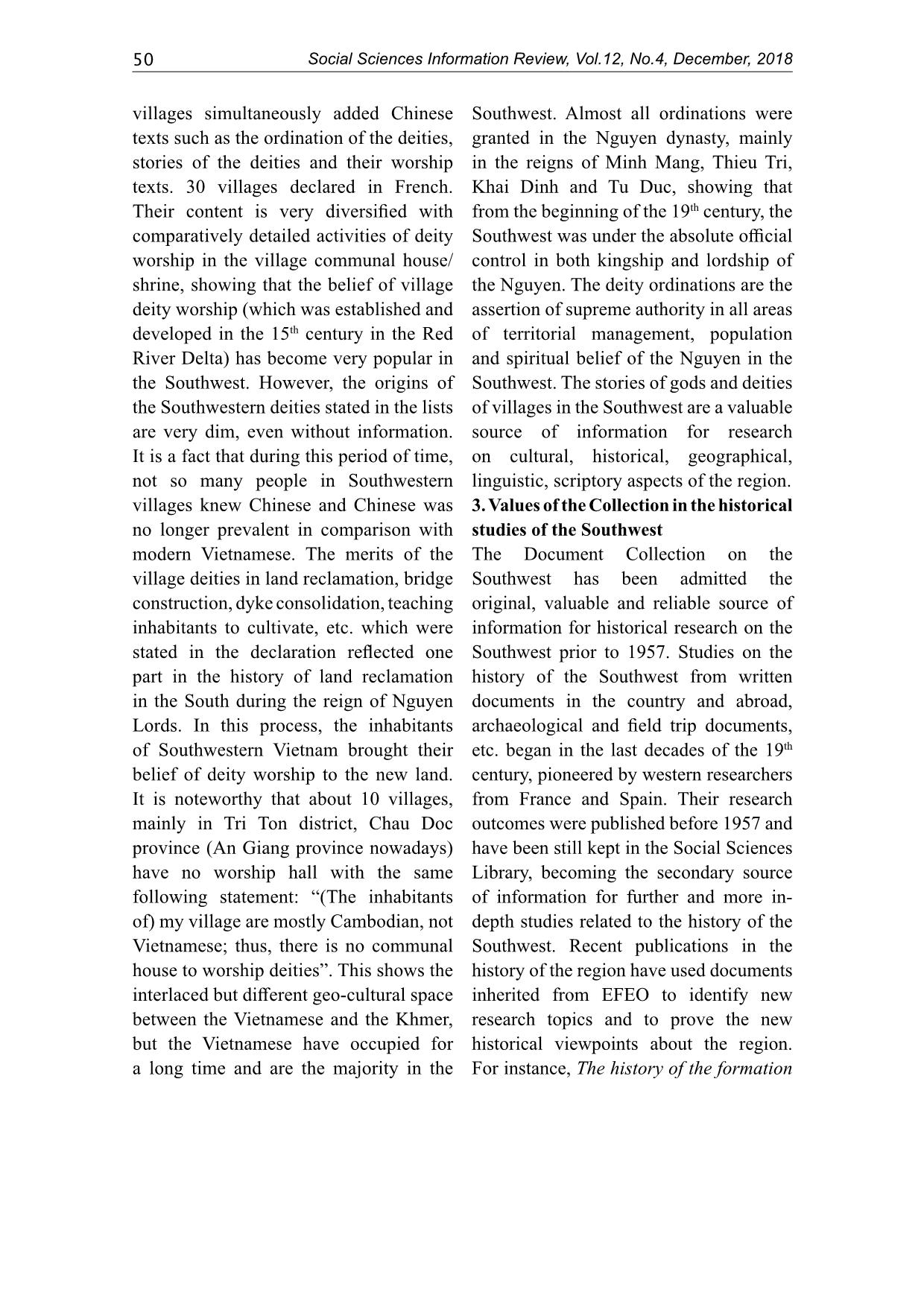
Trang 5
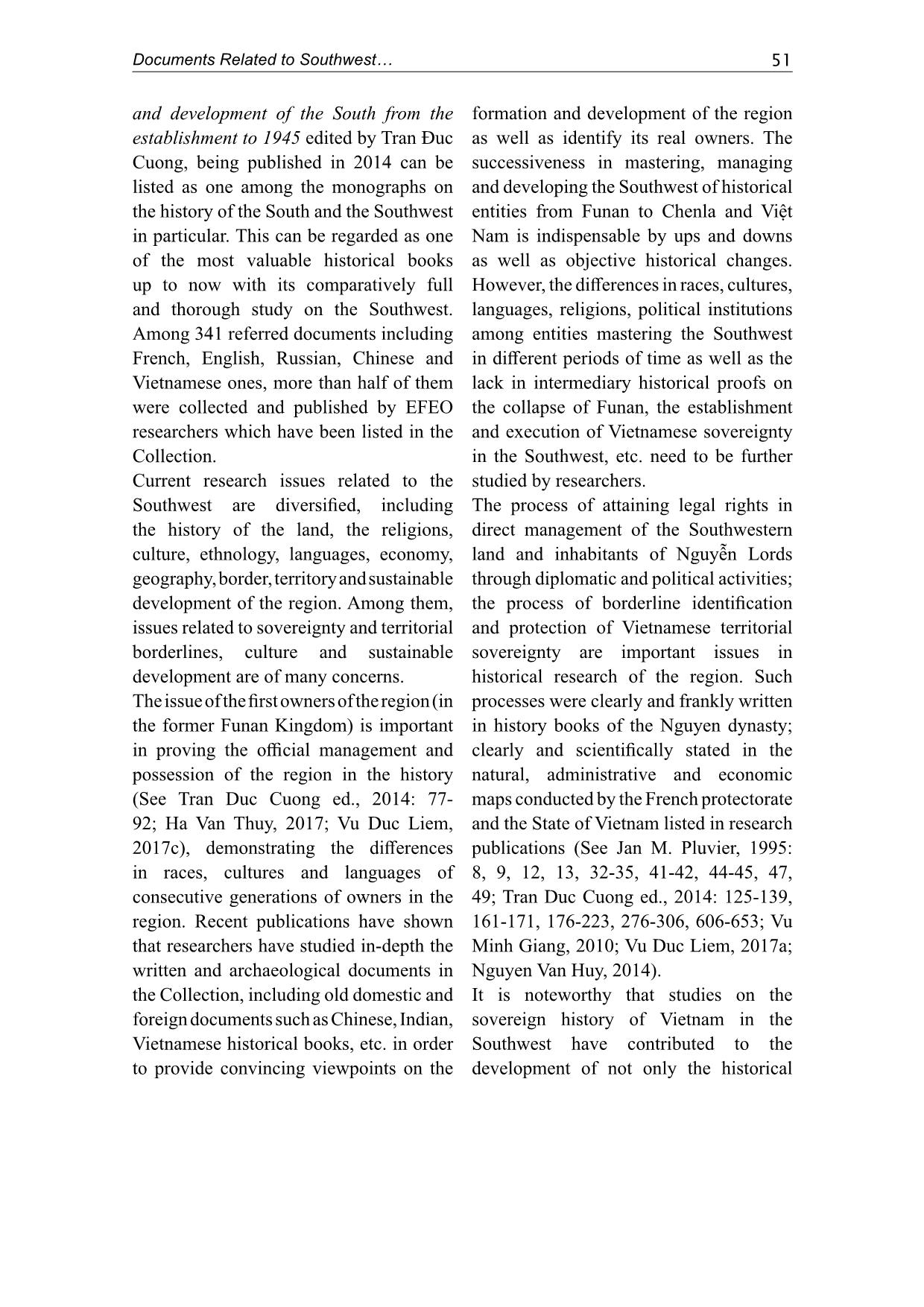
Trang 6
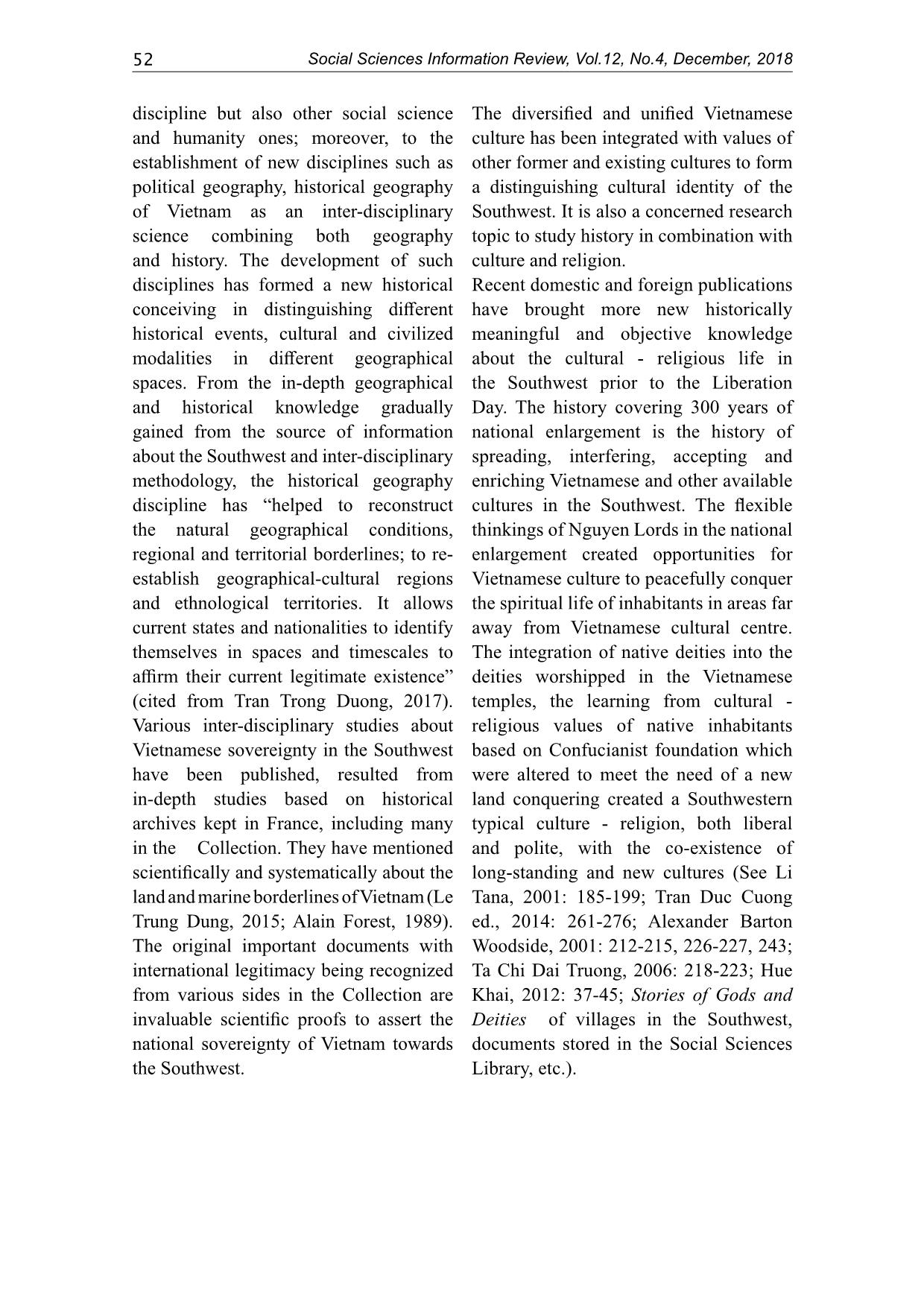
Trang 7
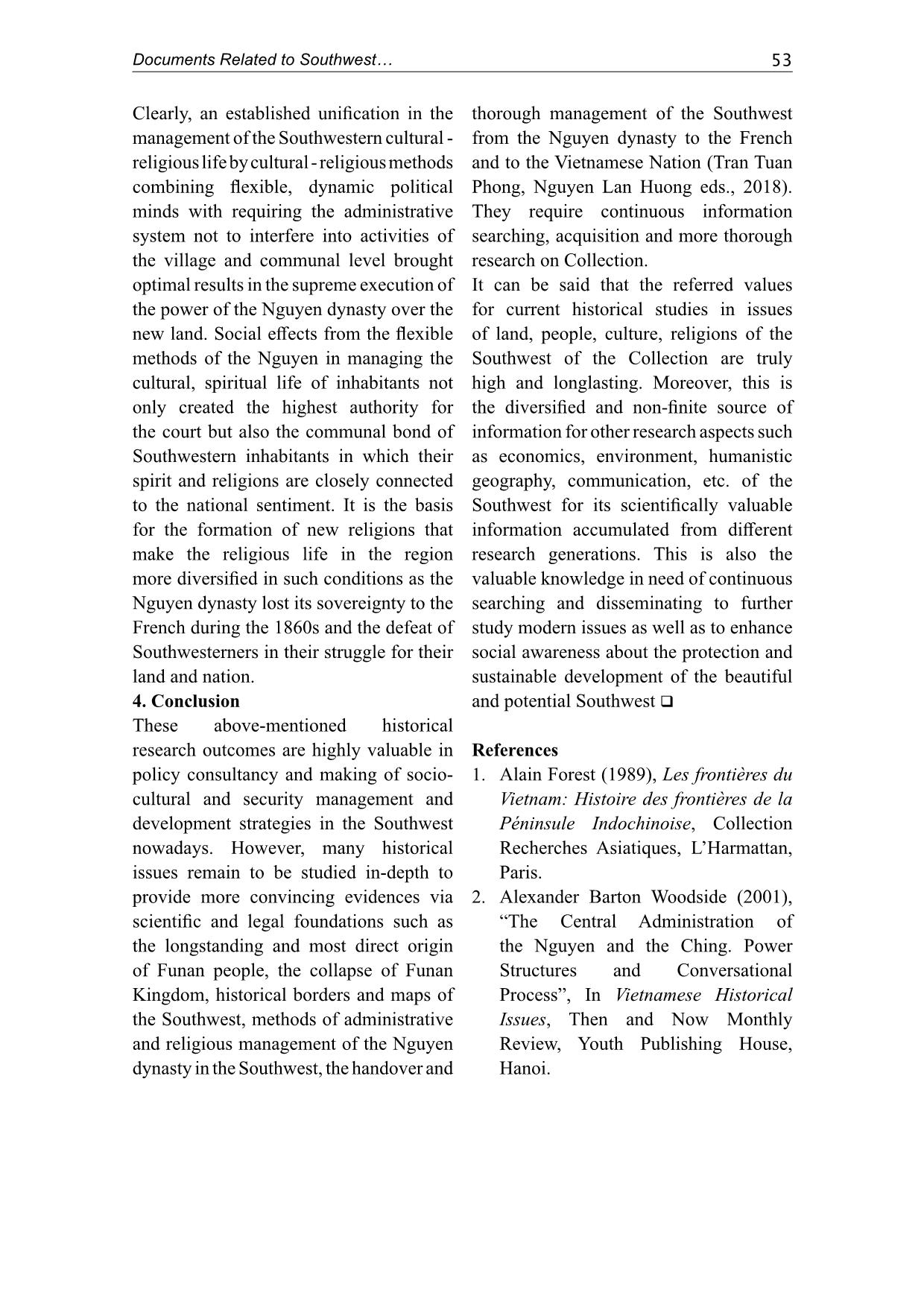
Trang 8
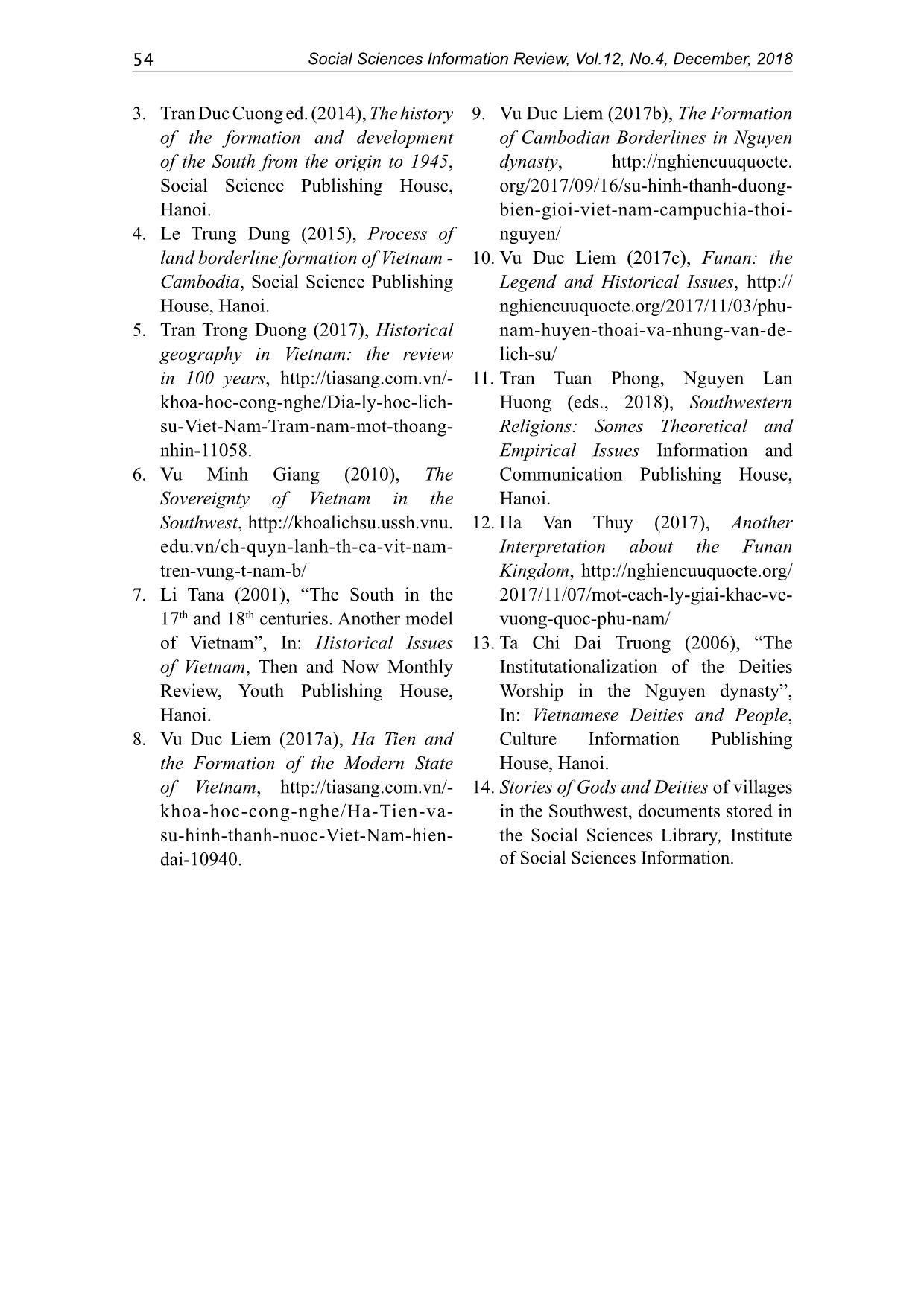
Trang 9
Tóm tắt nội dung tài liệu: Documents related to southwest of Viet Nam at the social sciences library and their values for studying the region history today
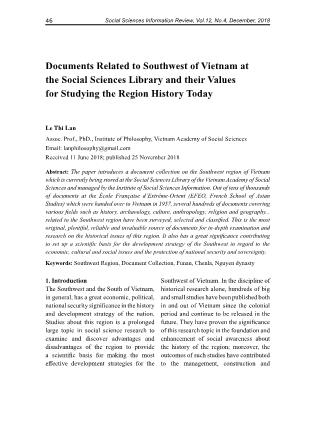
Social Sciences Information Review, Vol.12, No.4, December, 201846 Documents Related to Southwest of Vietnam at the Social Sciences Library and their Values for Studying the Region History Today Le Thi Lan Assoc. Prof., PhD., Institute of Philosophy, Vietnam Academy of Social Sciences Email: lanphilosophy@gmail.com Received 11 June 2018; published 25 November 2018 Abstract: The paper introduces a document collection on the Southwest region of Vietnam which is currently being stored at the Social Sciences Library of the Vietnam Academy of Social Sciences and managed by the Institute of Social Sciences Information. Out of tens of thousands of documents at the École Française d’Extrême-Orient (EFEO, French School of Asian Studies) which were handed over to Vietnam in 1957, several hundreds of documents covering various fi elds such as history, archaeology, culture, anthropology, religion and geography... related to the Southwest region have been surveyed, selected and classifi ed. This is the most original, plentiful, reliable and invaluable source of documents for in-depth examination and research on the historical issues of this region. It also has a great signifi cance contributing to set up a scientifi c basis for the development strategy of the Southwest in regard to the economic, cultural and social issues and the protection of national security and sovereignty. Keywords: Southwest Region, Document Collection, Funan, Chenla, Nguyen dynasty 1. Introduction The Southwest and the South of Vietnam, in general, has a great economic, political, national security signifi cance in the history and development strategy of the nation. Studies about this region is a prolonged large topic in social science research to examine and discover advantages and disadvantages of the region to provide a scientifi c basis for making the most eff ective development strategies for the Southwest of Vietnam. In the discipline of historical research alone, hundreds of big and small studies have been published both in and out of Vietnam since the colonial period and continue to be released in the future. They have proven the signifi cance of this research topic in the foundation and enhancement of social awareness about the history of the region; moreover, the outcomes of such studies have contributed to the management, construction and Documents Related to Southwest 47 development of the Southwest so far as well as in the future. Upon reviewing and selecting the most relevant information from all invaluable collections inherited from the EFEO (École Française d’Extrême-Orient - French School of the Asian Studies) in 1957, being stored and managed in the Social Sciences Library, the Institute of Social Sciences Information have made a specialized collection about the Southwest - the Document Collection of the Southwest (hereafter referred as the Collection). Its purpose is to create such a database to assist quick and relevant document searching and retrieval about the Southwest for the prolonged studies of this region. The paper introduces the Collection and discusses some of its notable values for historical research in the Southwest. 2. Introduction of the Document Collection of the Southwest in the Social Sciences Library The western researchers of EFEO had contributed greatly in collecting, keeping notes, processing and preserving systematically and carefully the information sources about the South and Southwest in the Bibliotheque de l’École Française d’Extrême-Orient (BEFEO - Library of EFEO). Most of such information resources are managed by the Social Sciences Library; lots of them possess valuable information about the Southwest in the form of maps, national gazettes, journals, books, Stories of Village Gods and Deities, etc. - Maps: Approximately 100 maps and atlases in the Map Collection mention about French Indochina and Cochinchina and are related to the Southwest in geography, administration, economy, communication and ethnology. Among the 12 atlases on geography - administration of Indochina and Cochinchina, 8 atlases were published in 1871 for 8 Southern provinces, namely: Ben Tre, Go Cong, My Tho, Sa Dec, Sai Gon, Cho Lon, Ba Ria, Bien Hoa. They are valuable atlases showing administrative management status and other aspects of the Southwest in the late 19th and early 20th centuries. Some of the maps can be listed as follows: Map of French Indochina which was made in the period of 1899- 1907; Map of French Cochinchina 1872- 1873; administrative and topographical maps of Southwestern provinces and districts like Soc Trang, Tay Ninh, Ha Tien; and some maps related to the borderland between Vietnam and Cambodia such as Atlas de l’Indochine (Atlas of Indochina) by Service Géographique de l’Indochine, 1920; Cochinchine administrat ... rench. Their content is very diversifi ed with comparatively detailed activities of deity worship in the village communal house/ shrine, showing that the belief of village deity worship (which was established and developed in the 15th century in the Red River Delta) has become very popular in the Southwest. However, the origins of the Southwestern deities stated in the lists are very dim, even without information. It is a fact that during this period of time, not so many people in Southwestern villages knew Chinese and Chinese was no longer prevalent in comparison with modern Vietnamese. The merits of the village deities in land reclamation, bridge construction, dyke consolidation, teaching inhabitants to cultivate, etc. which were stated in the declaration refl ected one part in the history of land reclamation in the South during the reign of Nguyen Lords. In this process, the inhabitants of Southwestern Vietnam brought their belief of deity worship to the new land. It is noteworthy that about 10 villages, mainly in Tri Ton district, Chau Doc province (An Giang province nowadays) have no worship hall with the same following statement: “(The inhabitants of) my village are mostly Cambodian, not Vietnamese; thus, there is no communal house to worship deities”. This shows the interlaced but diff erent geo-cultural space between the Vietnamese and the Khmer, but the Vietnamese have occupied for a long time and are the majority in the Southwest. Almost all ordinations were granted in the Nguyen dynasty, mainly in the reigns of Minh Mang, Thieu Tri, Khai Dinh and Tu Duc, showing that from the beginning of the 19th century, the Southwest was under the absolute offi cial control in both kingship and lordship of the Nguyen. The deity ordinations are the assertion of supreme authority in all areas of territorial management, population and spiritual belief of the Nguyen in the Southwest. The stories of gods and deities of villages in the Southwest are a valuable source of information for research on cultural, historical, geographical, linguistic, scriptory aspects of the region. 3. Values of the Collection in the historical studies of the Southwest The Document Collection on the Southwest has been admitted the original, valuable and reliable source of information for historical research on the Southwest prior to 1957. Studies on the history of the Southwest from written documents in the country and abroad, archaeological and fi eld trip documents, etc. began in the last decades of the 19th century, pioneered by western researchers from France and Spain. Their research outcomes were published before 1957 and have been still kept in the Social Sciences Library, becoming the secondary source of information for further and more in- depth studies related to the history of the Southwest. Recent publications in the history of the region have used documents inherited from EFEO to identify new research topics and to prove the new historical viewpoints about the region. For instance, The history of the formation Documents Related to Southwest 51 and development of the South from the establishment to 1945 edited by Tran Đuc Cuong, being published in 2014 can be listed as one among the monographs on the history of the South and the Southwest in particular. This can be regarded as one of the most valuable historical books up to now with its comparatively full and thorough study on the Southwest. Among 341 referred documents including French, English, Russian, Chinese and Vietnamese ones, more than half of them were collected and published by EFEO researchers which have been listed in the Collection. Current research issues related to the Southwest are diversifi ed, including the history of the land, the religions, culture, ethnology, languages, economy, geography, border, territory and sustainable development of the region. Among them, issues related to sovereignty and territorial borderlines, culture and sustainable development are of many concerns. The issue of the fi rst owners of the region (in the former Funan Kingdom) is important in proving the offi cial management and possession of the region in the history (See Tran Duc Cuong ed., 2014: 77- 92; Ha Van Thuy, 2017; Vu Duc Liem, 2017c), demonstrating the diff erences in races, cultures and languages of consecutive generations of owners in the region. Recent publications have shown that researchers have studied in-depth the written and archaeological documents in the Collection, including old domestic and foreign documents such as Chinese, Indian, Vietnamese historical books, etc. in order to provide convincing viewpoints on the formation and development of the region as well as identify its real owners. The successiveness in mastering, managing and developing the Southwest of historical entities from Funan to Chenla and Việt Nam is indispensable by ups and downs as well as objective historical changes. However, the diff erences in races, cultures, languages, religions, political institutions among entities mastering the Southwest in diff erent periods of time as well as the lack in intermediary historical proofs on the collapse of Funan, the establishment and execution of Vietnamese sovereignty in the Southwest, etc. need to be further studied by researchers. The process of attaining legal rights in direct management of the Southwestern land and inhabitants of Nguyễn Lords through diplomatic and political activities; the process of borderline identifi cation and protection of Vietnamese territorial sovereignty are important issues in historical research of the region. Such processes were clearly and frankly written in history books of the Nguyen dynasty; clearly and scientifi cally stated in the natural, administrative and economic maps conducted by the French protectorate and the State of Vietnam listed in research publications (See Jan M. Pluvier, 1995: 8, 9, 12, 13, 32-35, 41-42, 44-45, 47, 49; Tran Duc Cuong ed., 2014: 125-139, 161-171, 176-223, 276-306, 606-653; Vu Minh Giang, 2010; Vu Duc Liem, 2017a; Nguyen Van Huy, 2014). It is noteworthy that studies on the sovereign history of Vietnam in the Southwest have contributed to the development of not only the historical Social Sciences Information Review, Vol.12, No.4, December, 201852 discipline but also other social science and humanity ones; moreover, to the establishment of new disciplines such as political geography, historical geography of Vietnam as an inter-disciplinary science combining both geography and history. The development of such disciplines has formed a new historical conceiving in distinguishing diff erent historical events, cultural and civilized modalities in diff erent geographical spaces. From the in-depth geographical and historical knowledge gradually gained from the source of information about the Southwest and inter-disciplinary methodology, the historical geography discipline has “helped to reconstruct the natural geographical conditions, regional and territorial borderlines; to re- establish geographical-cultural regions and ethnological territories. It allows current states and nationalities to identify themselves in spaces and timescales to affi rm their current legitimate existence” (cited from Tran Trong Duong, 2017). Various inter-disciplinary studies about Vietnamese sovereignty in the Southwest have been published, resulted from in-depth studies based on historical archives kept in France, including many in the Collection. They have mentioned scientifi cally and systematically about the land and marine borderlines of Vietnam (Le Trung Dung, 2015; Alain Forest, 1989). The original important documents with international legitimacy being recognized from various sides in the Collection are invaluable scientifi c proofs to assert the national sovereignty of Vietnam towards the Southwest. The diversifi ed and unifi ed Vietnamese culture has been integrated with values of other former and existing cultures to form a distinguishing cultural identity of the Southwest. It is also a concerned research topic to study history in combination with culture and religion. Recent domestic and foreign publications have brought more new historically meaningful and objective knowledge about the cultural - religious life in the Southwest prior to the Liberation Day. The history covering 300 years of national enlargement is the history of spreading, interfering, accepting and enriching Vietnamese and other available cultures in the Southwest. The fl exible thinkings of Nguyen Lords in the national enlargement created opportunities for Vietnamese culture to peacefully conquer the spiritual life of inhabitants in areas far away from Vietnamese cultural centre. The integration of native deities into the deities worshipped in the Vietnamese temples, the learning from cultural - religious values of native inhabitants based on Confucianist foundation which were altered to meet the need of a new land conquering created a Southwestern typical culture - religion, both liberal and polite, with the co-existence of long-standing and new cultures (See Li Tana, 2001: 185-199; Tran Duc Cuong ed., 2014: 261-276; Alexander Barton Woodside, 2001: 212-215, 226-227, 243; Ta Chi Dai Truong, 2006: 218-223; Hue Khai, 2012: 37-45; Stories of Gods and Deities of villages in the Southwest, documents stored in the Social Sciences Library, etc.). Documents Related to Southwest 53 Clearly, an established unifi cation in the management of the Southwestern cultural - religious life by cultural - religious methods combining fl exible, dynamic political minds with requiring the administrative system not to interfere into activities of the village and communal level brought optimal results in the supreme execution of the power of the Nguyen dynasty over the new land. Social eff ects from the fl exible methods of the Nguyen in managing the cultural, spiritual life of inhabitants not only created the highest authority for the court but also the communal bond of Southwestern inhabitants in which their spirit and religions are closely connected to the national sentiment. It is the basis for the formation of new religions that make the religious life in the region more diversifi ed in such conditions as the Nguyen dynasty lost its sovereignty to the French during the 1860s and the defeat of Southwesterners in their struggle for their land and nation. 4. Conclusion These above-mentioned historical research outcomes are highly valuable in policy consultancy and making of socio- cultural and security management and development strategies in the Southwest nowadays. However, many historical issues remain to be studied in-depth to provide more convincing evidences via scientifi c and legal foundations such as the longstanding and most direct origin of Funan people, the collapse of Funan Kingdom, historical borders and maps of the Southwest, methods of administrative and religious management of the Nguyen dynasty in the Southwest, the handover and thorough management of the Southwest from the Nguyen dynasty to the French and to the Vietnamese Nation (Tran Tuan Phong, Nguyen Lan Huong eds., 2018). They require continuous information searching, acquisition and more thorough research on Collection. It can be said that the referred values for current historical studies in issues of land, people, culture, religions of the Southwest of the Collection are truly high and longlasting. Moreover, this is the diversifi ed and non-fi nite source of information for other research aspects such as economics, environment, humanistic geography, communication, etc. of the Southwest for its scientifi cally valuable information accumulated from diff erent research generations. This is also the valuable knowledge in need of continuous searching and disseminating to further study modern issues as well as to enhance social awareness about the protection and sustainable development of the beautiful and potential Southwest References 1. Alain Forest (1989), Les frontières du Vietnam: Histoire des frontières de la Péninsule Indochinoise, Collection Recherches Asiatiques, L’Harmattan, Paris. 2. Alexander Barton Woodside (2001), “The Central Administration of the Nguyen and the Ching. Power Structures and Conversational Process”, In Vietnamese Historical Issues, Then and Now Monthly Review, Youth Publishing House, Hanoi. Social Sciences Information Review, Vol.12, No.4, December, 201854 3. Tran Duc Cuong ed. (2014), The history of the formation and development of the South from the origin to 1945, Social Science Publishing House, Hanoi. 4. Le Trung Dung (2015), Process of land borderline formation of Vietnam - Cambodia, Social Science Publishing House, Hanoi. 5. Tran Trong Duong (2017), Historical geography in Vietnam: the review in 100 years, khoa-hoc-cong-nghe/Dia-ly-hoc-lich- su-Viet-Nam-Tram-nam-mot-thoang- nhin-11058. 6. Vu Minh Giang (2010), The Sovereignty of Vietnam in the Southwest, edu.vn/ch-quyn-lanh-th-ca-vit-nam- tren-vung-t-nam-b/ 7. Li Tana (2001), “The South in the 17th and 18th centuries. Another model of Vietnam”, In: Historical Issues of Vietnam, Then and Now Monthly Review, Youth Publishing House, Hanoi. 8. Vu Duc Liem (2017a), Ha Tien and the Formation of the Modern State of Vietnam, khoa-hoc-cong-nghe/Ha-Tien-va- su-hinh-thanh-nuoc-Viet-Nam-hien- dai-10940. 9. Vu Duc Liem (2017b), The Formation of Cambodian Borderlines in Nguyen dynasty, org/2017/09/16/su-hinh-thanh-duong- bien-gioi-viet-nam-campuchia-thoi- nguyen/ 10. Vu Duc Liem (2017c), Funan: the Legend and Historical Issues, http:// nghiencuuquocte.org/2017/11/03/phu- nam-huyen-thoai-va-nhung-van-de- lich-su/ 11. Tran Tuan Phong, Nguyen Lan Huong (eds., 2018), Southwestern Religions: Somes Theoretical and Empirical Issues Information and Communication Publishing House, Hanoi. 12. Ha Van Thuy (2017), Another Interpretation about the Funan Kingdom, 2017/11/07/mot-cach-ly-giai-khac-ve- vuong-quoc-phu-nam/ 13. Ta Chi Dai Truong (2006), “The Institutationalization of the Deities Worship in the Nguyen dynasty”, In: Vietnamese Deities and People, Culture Information Publishing House, Hanoi. 14. Stories of Gods and Deities of villages in the Southwest, documents stored in the Social Sciences Library, Institute of Social Sciences Information.
File đính kèm:
 documents_related_to_southwest_of_viet_nam_at_the_social_sci.pdf
documents_related_to_southwest_of_viet_nam_at_the_social_sci.pdf

